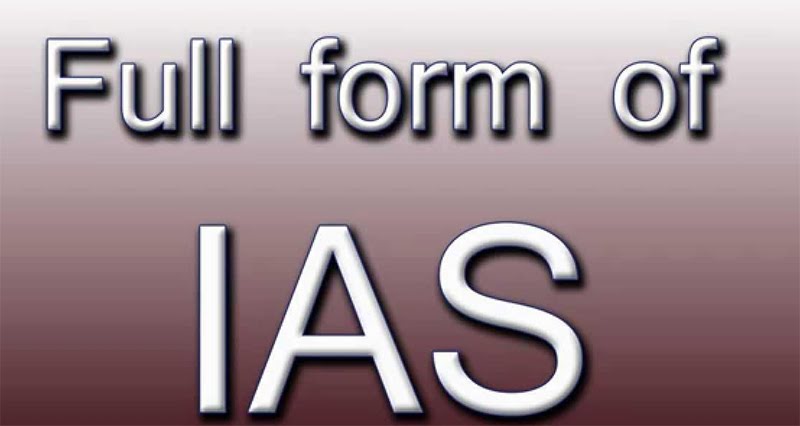The IAS is one of the most sought-after government services. The UPSC Exam, which is held once a year, is required to pass in order to be recruited into the IAS. The basic concept of this service is that one must be familiar with the full IAS form. Indian Administrative Services is the full name of the IAS. Every year, UPSC holds a variety of recruitment examinations. The IAS Exam is one of them. Even though it is beyond belief that many people are unaware of this exam or the IAS in its entirety, it is always fair to re-learn about it.
IAS Full Form
It is one of the three All India Administrations, the other two being the Indian Police Service (IPS) and the Indian Forest Service (IFoS). The IAS serves in as the backbone of the Indian government and assumes a significant role in dealing with its organization. It gives you a chance to help the country, influence policy, and have a big effect on society. You will find everything you need to know about the IAS exam in this comprehensive guide. The article sheds light on the eligibility requirements and IAS officer roles and responsibilities.
Check Here:-
About Full Form of IAS
Indian Administrative Service is the full name of the IAS. It is perhaps of the most lofty and competitive exams in India. The Indian Administrative Service (IAS) exam is administered annually by the Union Public Service Commission to select and hire qualified individuals for government positions in India. Every year, thousands of hopeful candidates from various social categories and strata take the exam.
What is The IAS Exam?
The prestigious IAS Exam was established in the year 1858 as the Imperial Civil Service. It was established as the Indian Administrative Service (IAS) in 1950. The Indian Administrative Service (IAS) holds the highest power and prestige of any Indian administrative position. The candidates qualified might be designated by the Association/State government straightforwardly or might be doled out posts in the district level.
IAS Eligibility Criteria
The fundamental requirements that one needs to satisfy to fit the bill for the IAS exam are as per the following:
- Candidate’s Nationality- The competitor must be an Indian national to attempt to endeavor the Indian Civil Service Exam.
- Age Limit – The exam can only be taken by people who are 21 years old or older, and the maximum age that can be taken is 32.
- Educational Qualification – The candidate should be an alum from a college enlisted under or perceived by the Public authority. However, applicants for the exam who are awaiting graduation results may also apply.
- Number of Attempts – The following categories have been given to a specific number of attempts.
-
- General – 6 attempts
- OBC – 9 attempts
- SC/ST – No fixed limit
- Quite a few endeavors can be made by the SC/ST candidates until the competitor arrives at the greatest age limit for the examination, i.e, 37 years
- Economically Weaker Section – 6 attempts
Check Here:-
Commitment & Duties of an IAS Officer
The renowned post of an IAS officer contains various jobs and obligations. In order to pledge allegiance to this prestigious position, a candidate with the utmost sincerity, patience, and a wide range of skills has been selected. The jobs and obligations that an IAS official needs to expect can be recorded as follows –
- An IAS officer’s roles and responsibilities change depending on where they are in their career.
- The responsibilities of an IAS officer range from district to state level administration.
- An official needs to play out his/her obligations as per the request for the Public authority of India.
- May be given the responsibility of developing and carrying out a particular policy in accordance with government directives.
- Traveling to the locations where the particular policy is to be implemented.
- Laying out arrangements to dispense required assets for concerned undertakings.
- In the event that an official during his vocation is allocated to satisfy his obligations at the state or sub-divisional level, he/she needs to accept obligations relating to the rule of law.
- Needs to carry out developmental responsibilities at the district level.
- May act as a State Secretariat or as Heads of governmental departments. An officer has a significant impact not only on the formulation of beneficial policies but also on their implementation at the central level.
Interesting Facts about IAS
- Satyendranath Tagore was the first IAS official in Quite a while.
- The first Indian IAS officer to be a woman was Anna Rajam Malhotra. a woman who passed the 1951 Civil Service Exam. In 1972, Kiran Bedi received his commission as an IPS officer.
- She is the first Indian woman to hold an officer position in the Indian Police Service (IPS).
- IAS officers are stationed in a variety of locations, including semi-urban, urban, and rural areas.
- Ansar Ahmad Shaikh is India’s youngest IAS officer.
Check Here:-
Final Words
As one of the three All-India administrations, it is viewed as the foundation of India’s regulatory apparatus. Candidates for the IAS are chosen through the Civil Services Examination. The IAS oversees the entire government, including the formulation, implementation, and evaluation of policies at the district, state, and national levels.
